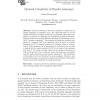Free Online Productivity Tools
i2Speak
i2Symbol
i2OCR
iTex2Img
iWeb2Print
iWeb2Shot
i2Type
iPdf2Split
iPdf2Merge
i2Bopomofo
i2Arabic
i2Style
i2Image
i2PDF
iLatex2Rtf
Sci2ools
137
click to vote
CORR
2009
Springer
2009
Springer
Quotient Complexity of Regular Languages
The past research on the state complexity of operations on regular languages is examined, and a new approach based on an old method (derivatives of regular expressions) is presented. Since state complexity is a property of a language, it is appropriate to define it in formallanguage terms as the number of distinct quotients of the language, and to call it "quotient complexity". The problem of finding the quotient complexity of a language f(K, L) is considered, where K and L are regular languages and f is a regular operation, for example, union or concatenation. Since quotients can be represented by derivatives, one can find a formula for the typical quotient of f(K, L) in terms of the quotients of K and L. To obtain an upper bound on the number of quotients of f(K, L) all one has to do is count how many such quotients are possible, and this makes automaton constructions unnecessary. The advantages of this point of view are illustrated by many examples. Moreover, new general o...
CORR 2009 | Education | Quotient | Quotient Complexity | Regular |
Related Content
| Added | 16 Feb 2011 |
| Updated | 16 Feb 2011 |
| Type | Journal |
| Year | 2009 |
| Where | CORR |
| Authors | Janusz A. Brzozowski |
Comments (0)

